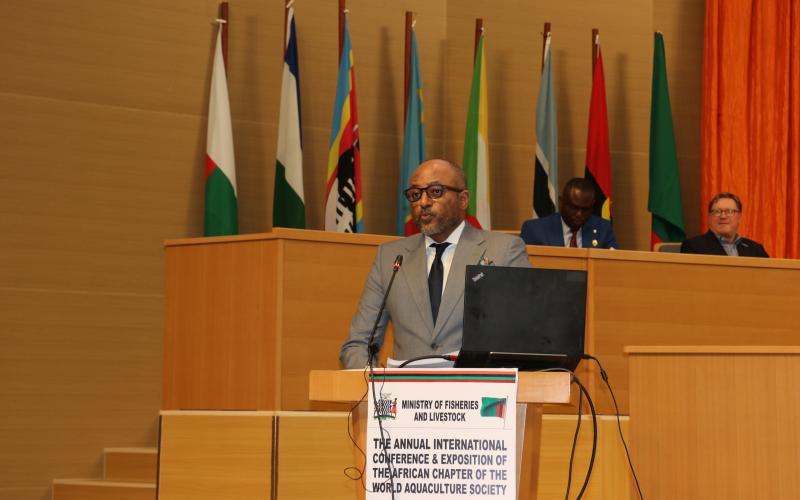
- Innovative and tailor-made financing in Aquatic Food Systems remains a subject under-explored in most African countries.
- There is need to address the information gap between the lenders and borrowers of financial services.
- Too many bottlenecks have limited smallholder farmers from thriving in the AFS sector.
Financing the Aquatic Food System (AFS) sector remains under-explored, especially in Africa. This has limited its potential to grow at a pace other agricultural industries are growing. An assessment conducted by WorldFish researchers indicates that the continent’s population is expected to be at 2.4 billion by 2050. Nourishing this population would be challenging unless Africa addresses the critical issues, especially financing.
WorldFish explored the subject in a thought-provoking discussion at the Aquaculture Africa 2023 conference held from November 13-16, 2023. The conference took place in Lusaka, Zambia under the theme; ‘Resilient value chains in the blue economy.’
With the gap appreciated in bringing innovative and tailor made financing to the AFS sector, WorldFish under the auspices of the Ministry of Fisheries and Livestock(MFL) sponsored a side event dubbed; ‘Thriving Aquatic Foods through Innovative Financing.’ The event sought to unlock financing hurdles the sector faces.
The event attracted a full-capacity audience from the private and public sectors, academicians, Small and Medium Entrepreneurs (SMEs), and the donor community. Panelists were drawn from; The Bankers Association of Zambia (BAZ), the Insurance Association of Zambia (IAZ), the Aquaculture Development Association of Zambia (ADAZ), the Government through the Department of Fisheries (DoF), SMEs and the Citizen’s Economic Empowerment Commission(CEEC).
Addressing the Disconnect in Information for Farmer Access to Financial Services
Representing the SMEs, Ms. Edinah Chama Kalala, founder of Lyeni Investments, a fish processing company explained that SMEs in AFS face various challenges that make it difficult to sustain their businesses. She added that there is need for more investment in facilities such as cold storage, to enable more SMEs in the value chain to sustain their businesses.
ADAZ echoed sentiments from SMEs adding that, “there are so many bottlenecks in accessing financing due to collateral issues, and high interest rates for the small-scale farmers who cannot afford big collateral on top of exorbitant interest rates,” said Baldwin Chibuta, ADAZ secretary.
The BAZ, represented by Mr. Justine Chanda from the National Savings and Credit Bank (NATSAVE), explained that with support from institutions like WorldFish, the bank conducted research to understand the unique nature of the sector. This enabled them to develop tailor-made products to suit all actors. He explained that some of the strides taken include the consideration of the growth period of fish.
“We have come up with products such as agriculture loan, that allow a six-month grace period before repayment and then we have a bullet payment for this where farmers pay at once. We also now have a group-lending product ideal for farmers who do not have collateral. These products will be able to bring farmers to work together and to leverage on economies of scale.” Chanda stated.
Regulating the Quality of Fingerlings
The CEEC called on the government through the MFL to regulate the quality of fingerlings produced by hatchery operators to avert losses that most SMEs face and hence default in paying back loans. Mrs. Lucy Mbao Mataka, Director at CEEC further urged the government to look into the cost of fish feed which reduces the profit margin of the SMEs.
CEEC’s submission on the cost of feed reiterated WorldFish Director General’s sentiments in his speech at the conference opening ceremony.
Dr. Mohammed Essam stated, “In a diverse and potentially rich landscape of African aquaculture, the sector faces challenges that must be strategically addressed to unlock this full potential. One of the primary concerns is the cost of feed that many of you are aware of which astonishingly accounts for up to 60% of operational costs that greatly affect the profitability and stability of the aquaculture ventures across the continent.”
On how they are accommodating the AFS sector, CEEC explained that they have restructured their loan products, especially addressing the rigidity in repayment. She said that, for instance, if a farmer submits that their fish will be ready in 7 months, the loan would be restructured to match the submitted growth period.
The Insurance Association of Zambia highlighted that despite complaints from SMEs about the unavailability of insurance products, aquaculture insurance cover is available to all members of ADAZ. Dr. Nkaka Mwashika, Chief Executive Officer of the association pointed out that the major problem is a disconnect between the lenders and the borrowers. He stated that the lenders are giving out these loans without insurance.
“What we need to do is to restructure the lending products. Both CEEC and banks should incorporate a component of insurance as they lend out the money. That way both the lender and the farmer benefit. There is a critical disconnect that prevents intended beneficiaries from receiving information about financial services offered by the banks which needs to be addressed urgently,”he said.
The government through Mr. Mbawai Mbewe, Director of Fisheries MFL stated that their focus is to help the different players and link them where possible to where they can be able to get inputs for them to invest and benefit profitably.
Minister of Finance and National Planning Dr. Situmbeko Musokotwane MP, represented by Hon. Minister of Youth, Sport and Art, Elvis Nkandu, MP, gave a keynote speech while Hon. Makozo Chikote, Minister of Fisheries and Livestock gave the opening speech at the event.
Other notable officials present were the Northern province Minister, Hon. Leonard Mbao MP, whose province hosts major water bodies in the country, and WorldFish Director General Dr. Mohammed Essam.
